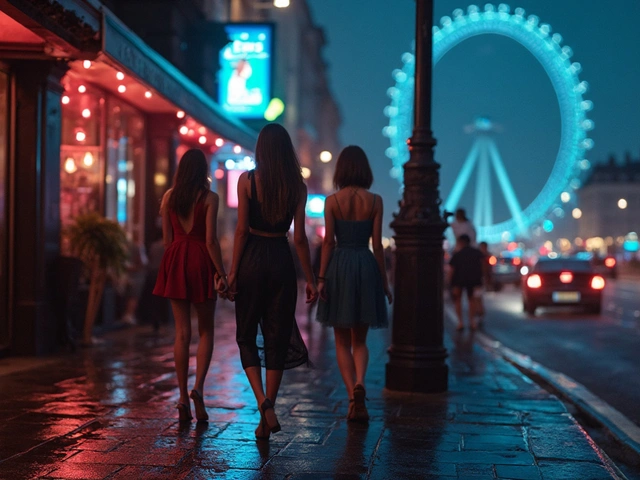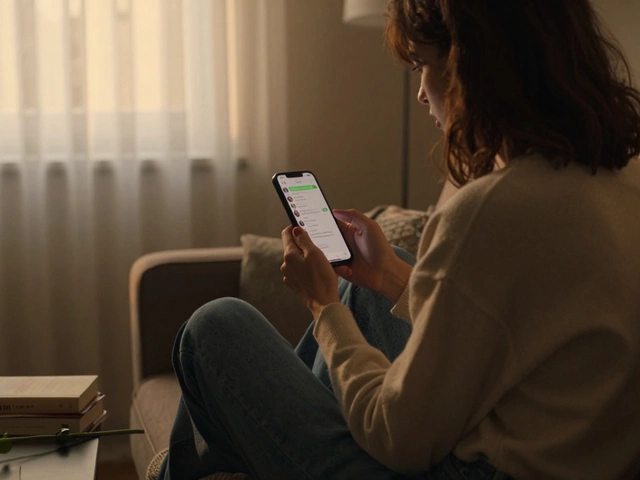Been in a situation where you feel like you're back in high school dealing with cliques? Despite its bustling diversity, London isn't immune to social drama reminiscent of the film 'Mean Girls.' Whether you're a local or new to the city, understanding these dynamics can make a world of difference in your social life.
First things first, recognize that social cliques can form anywhere—your office, social clubs, or even among your group of friends. They thrive on exclusivity, often leaving others on the outside looking in. In London, these groups sometimes get a sophisticated twist, blending in perfectly with the city’s vibrant lifestyle, but don’t be fooled—they can be just as toxic.
So why do these mean girl behaviors exist? For some, it's about maintaining a certain image or status. For others, it may be about insecurity masked by dominance. Understanding this psychology can help you navigate these waters smoothly. We'll delve into this and offer practical tips for improving your social interactions in the sections ahead.
- Introduction to London Cliques
- Parallels with 'Mean Girls'
- Types of Social Cliques
- Psychology Behind the Behavior
- Effects on Individuals
- Strategies for Positive Interaction
Introduction to London Cliques
London is a massive melting pot of cultures, ideas, and personalities. It’s a city where you can find almost every type of person mingling together. However, just like everywhere else, it’s also home to a myriad of social cliques that carve out their own spaces amidst the hustle and bustle.
These cliques can often be spotted at the trendiest cafes, the newest bars in Shoreditch, or networking events across the city. They're usually groups bound by a common interest, background, or sometimes shared career ambitions. But, don't be fooled into believing they’re harmless get-togethers. The dynamics can sometimes tilt toward exclusivity and elitism.
Having a deserted feeling when you see a mean girls situation isn’t uncommon in London. In the workplace, it might be the odd lunch invitation that you never get or at uni, it's that study group that always leaves you out. The cliques here can sometimes feel like social signifiers rather than genuine friendships.
Getting a Grip on the Clique Culture
What's intriguing about cliques in London is how they often mirror the city’s social fabric itself. They embody the chase for status, the desire for belonging, or sometimes just comfort in shared experiences.
There's a tendency to see these groups in every part of life: professional circles, local communities, or even among expats. Whether it's the creative innovators in Camden or the financial whizz-kids down in Canary Wharf, each carries its own sense of 'in-crowd' vibe.
Interestingly, a quick peek at surveys shows that about 60% of Londoners feel they've been excluded from groups at some point. This stat reflects both the allure and the isolation that these social tribes can bring.
It's not about shunning these cliques entirely but understanding their dynamics and how to engage or disengage positively. Recognizing their impact is a good first step towards building better and more inclusive social interactions.
Parallels with 'Mean Girls'
Remember the Plastics from the movie 'Mean Girls'? London has its own version of those cliques, often spotted in trendy coffee shops or exclusive nightclubs. These groups might not wear pink on Wednesdays, but the influence they wield can be just as stifling.
Like in the movie, these mean girls often base their hierarchy on superficial standards like appearance, social media clout, or financial status. It's not uncommon to find them at the latest pop-up bar, seemingly ruling the social scene while many feel the pressure to conform or gain approval.
Clicking with the Clique
The social dynamics in London can often mirror those infamous Burn Book scenarios, where gossip spreads quickly within these circles. It's interesting to note that social media, which was less of a factor in the early 2000s film, plays a significant role today. Platforms like Instagram can amplify mean girl antics, making exclusions and mockery more public.
Real-Life Impacts
These social structures aren't just about laughs or minor inconveniences. For instance, studies suggest people often report increased stress or decreased self-esteem when navigating these cliques.
| Aspect | Film | London Reality |
|---|---|---|
| Location | High School | Nightclubs, Cafes, Offices |
| Basis for Hierarchy | Popularity, Looks | Social Media Clout, Wealth |
| Impact on Individuals | Emotional, Social | Stress, Self-Esteem Issues |
Understanding these parallels helps make sense of the social landscape. Recognizing how certain social behaviors play out in real life can be the first step towards healthier interactions.
Types of Social Cliques
Ever noticed how people tend to group themselves? In London, it's no different. The city, though massive, has its share of distinct social cliques that parallel the iconic Mean Girls movie. Knowing these groups can help you identify them in your life or, even better, avoid getting entangled in unnecessary drama.
Office Cliques
Ah, the classic office clique! In workplaces all over London, you'll find groups congregating at lunch or the water cooler, often excluding others. This group-think can sometimes impact promotions or projects, and the best way to handle it is by staying professional and finding allies who prioritize teamwork over gossip.
The Socialites
In the lively social scene, you have your glamorous set—those who always seem to grace the latest club openings or gallery events in Shoreditch or Soho. This is all about status, and getting into these circles can feel like a game without clear rules. Understanding their motivations can help you decide if it's worth your time or if you'd rather invest in genuine connections elsewhere.
Neighborhood Peer Groups
Your neighborhood can also influence clique tendencies. Those in posh areas might form tight-knit groups around shared lifestyles or clubs. While these groups can offer great networking opportunities, they might also inadvertently exclude those who don't fit a certain mold. It's essential to carve your niche while maintaining individuality.
Common Characteristics
Here's a quick breakdown of common traits found in these cliques:
| Type | Main Motivation | Impact |
|---|---|---|
| Office Cliques | Control | Affects growth and morale |
| The Socialites | Status | Promotes exclusivity |
| Neighborhood Groups | Shared Interests | Both welcoming and excluding |
Understanding these variations prepares you to make informed choices about who to engage with, making city life just a bit kinder.

Psychology Behind the Behavior
When we talk about mean girls around London, we're often discussing behavior that's rooted deep in human psychology. It's not just about who sits with who at the lunch table, but about underlying intents and emotions. Let's break down why these cliques form and how their members tick.
Seeking Social Status
A big reason people cling to cliques is the innate human desire for social status. Ever since the days of our cave-dwelling ancestors, being part of a group meant higher chances of survival. In modern times, it's less about survival and more about looking good socially. Members of cliques often work to protect their group's status within the larger social ecosystem of London, which sometimes means tearing others down to build themselves up.
Insecurity and Defense
Interestingly, the behavior of a mean girl can also stem from insecurity. When someone feels unsure about themselves, they might project confidence or superiority to hide their vulnerabilities. This act serves as a defense mechanism, building a shield against perceived threats, whether real or imagined.
Group Dynamics
Another layer to consider is group dynamics. When in a clique, individuals may engage in behavior that they wouldn’t normally display on their own. It's called 'groupthink', where the desire for harmony or conformity results in irrational or dysfunctional decision-making. In such scenarios, personal moral compasses may get a little wacky, leading to the kind of behavior associated with those notorious mean girl cliques.
Peer Pressure and Consistency
A surprising influencer in mean girl behavior is something as simple as peer pressure. When members observe their peers acting in a certain way, they're more likely to follow suit. It creates a sense of belonging and consistency within the group. No one wants to be the odd one out, even if it means sidelining personal values.
| Reason | Description |
|---|---|
| Social Status | Desire to be viewed as superior or part of an elite group. |
| Insecurity | Compensating for personal vulnerabilities by acting tough. |
| Group Dynamics | Influenced by the behavior of others in the cliques. |
| Peer Pressure | Participating in mean behavior to fit in or not stand out negatively. |
Understanding these factors is the first step to dealing with any mean girl drama you might face. Recognizing that often these actions have more to do with the individual's personal struggles than anything you've done can make navigating these social connections a little less daunting.
Effects on Individuals
Finding yourself caught in the middle of a mean girls scenario can really mess with your head, especially in a city as competitive as London. These social dynamics do more than just ruffle a few feathers—they can have significant impacts on both mental and emotional well-being.
The Isolation Factor
Being excluded from a clique can feel like being locked out of a party you weren’t invited to. This sense of isolation often leads to feelings of loneliness and can take a toll on self-esteem. Nobody wants to feel like they're not good enough, and unfortunately, mean girls feed off this vulnerability.
Stress and Anxiety
Trying to fit in or defend yourself against subtle jabs and snide remarks can be taxing. Studies suggest that people involved in social conflicts report higher stress levels and are more prone to anxiety. In London’s fast-paced society, this added stress can impact everything from your job performance to your social life.
Impact on Relationships
The influence of London cliques can trickle into other areas of life, affecting relationships with family, friends, and colleagues. It can create trust issues and make you hesitant to open up, fearing judgment or betrayal. Over time, this could wear down your social connections, making your support system feel shaky.
Coping Strategies
Of course, not all is doom and gloom. Here are some tips to handle the pressure:
- Build a solid support network outside the clique. Having friends who truly care can diminish the clique's impact.
- Focus on your strengths and interests, which can boost your self-esteem and help you attract genuine connections.
- Don’t be afraid to talk to someone about what you're going through—a therapist or a trusted friend can offer perspective.
Being aware of these effects can help you take proactive steps to protect your mental health. The best takeaway? Knowing you’re not alone and taking charge can make a big difference in navigating these social hurdles.
Strategies for Positive Interaction
Navigating around mean girls and social cliques might seem tricky, but there are ways to turn interactions into more positive experiences. It’s all about understanding behavior and making smart moves.
Understanding Dynamics
The first step is recognizing why cliques exist. Often, they're about wielding power or dealing with personal insecurities. Spotting these motivations helps you not take things personally and engage more effectively.
Build Genuine Connections
Instead of trying to fit into a specific group, focus on creating real connections. Find common interests beyond superficial layers. When conversations get genuine, they often transcend the boundaries of cliques.
Be Open and Inclusive
Set an example by being open-hearted. Invite others to join activities or conversations. Being inclusive helps dissolve the tight circle mentality typical of London cliques.
Communicate Assertively
If you feel marginalized, it’s okay to speak up. Use 'I' statements to express your feelings without coming across as aggressive. For instance, 'I feel a bit left out during discussions, and I'd love to be more involved.'
- Practice active listening to make others feel heard.
- Ask open-ended questions to encourage sharing.
Seek Support
Don’t hesitate to seek support from friends or professionals if the situation becomes too stressful. Sometimes, getting an outside perspective can help clarify how to handle things.
Stats and Facts
Did you know that 68% of people feel they’ve been part of a clique at some point? The feelings of exclusion aren't just US-based phenomena; they're alive in cities like London too.
| Interaction Strategy | Effectiveness |
|---|---|
| Genuine Conversations | High |
| Inclusive Activities | Medium |
| Assertive Communication | High |
Remember, the aim is to create an environment where everyone feels valued. With these strategies, you can navigate London cliques more effectively and enjoy a healthier social scene.






